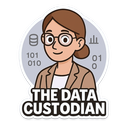organising the world's information
Design and use relational databases to manage data.
Your Learning Journey
Understanding Data Redundancy in Flat Files
Designing a Relational Model with Linked Tables
Creating Tables and Setting Data Types
Establishing Relationships with Primary and Foreign Keys
Using a QBE Grid to Retrieve Specific Data
Building User-Friendly Interfaces for Your Database
Low Stakes Knowledge Check
Module introduction
Have you ever tried to find a specific piece of information in a huge, messy list? It’s frustrating and slow. From your favourite streaming service recommending what to watch next, to a library keeping track of thousands of books, the world runs on organised information. This journey will take you from the chaos of simple lists to being able to confidently design and build your own structured, efficient databases. By the end of this module, you will have the power to tame massive amounts of data, ask complex questions, and get the exact answers you need in an instant. We will unlock the secrets behind how the world’s most powerful information systems are built.
Why does this module matter?
Every time you search for a product online, book a ticket, or even check your school timetable, you are using a database. Understanding how to organise information isn't just a technical skill; it's a fundamental life skill for making sense of a complex world. This module will give you the tools to structure data logically, making you a more efficient problem-solver and a smarter user of technology.
1
For you
This module will help you develop several key computing personas:

The Data Custodian: This is the core persona for this module. You will learn the entire lifecycle of data, from understanding its basic structure to organising it in efficient, professional databases and using those databases to generate meaningful information.

The Analyst: A key part of database design is understanding what a user or client needs and translating that into a technical plan. As an Analyst, you will learn how to look at a real-world problem and design a database structure that provides a clear, logical, and valuable solution.

The System Integrator: A relational database isn't just one table; it's a system of multiple tables that interact perfectly. This persona focuses on how you connect these individual components using primary and foreign keys to build a single, functional, and reliable system.
2
For your future
The skills you learn in this module are the starting point for many exciting and in-demand careers. One of the most direct pathways is to become a Data Scientist.
Career focus: Data Scientists are experts who use their skills in programming, statistics, and database management to find trends, make predictions, and extract valuable insights from huge amounts of raw data. They help businesses, scientists, and governments make smarter, data-driven decisions.
Key Skills: This module builds the foundational database design and querying skills that are essential for any data scientist. You will learn how to structure data to remove errors and how to ask questions (query) to retrieve specific information, which are the first steps in any data analysis project.
Interesting facts: The demand for data scientists is incredibly high, with job growth projected to be much faster than the average for all other occupations. The role is often described as the "sexiest job of the 21st century" because it combines the skills of a computer scientist, a statistician, and a storyteller to uncover hidden truths in data.
Our Learning Journey
Our journey begins by exploring the problems and chaos that arise when we try to manage information in simple lists, highlighting issues like data duplication and inconsistency. We will then discover how to solve these problems by designing a 'relational' database, splitting our data into sensible, linked tables. You will get hands-on experience building this system, defining the data types, setting up the crucial links between tables, and finally, learning how to ask your database powerful questions to filter, sort, and retrieve the exact information you need.
Last modified: January 12th, 2026





















